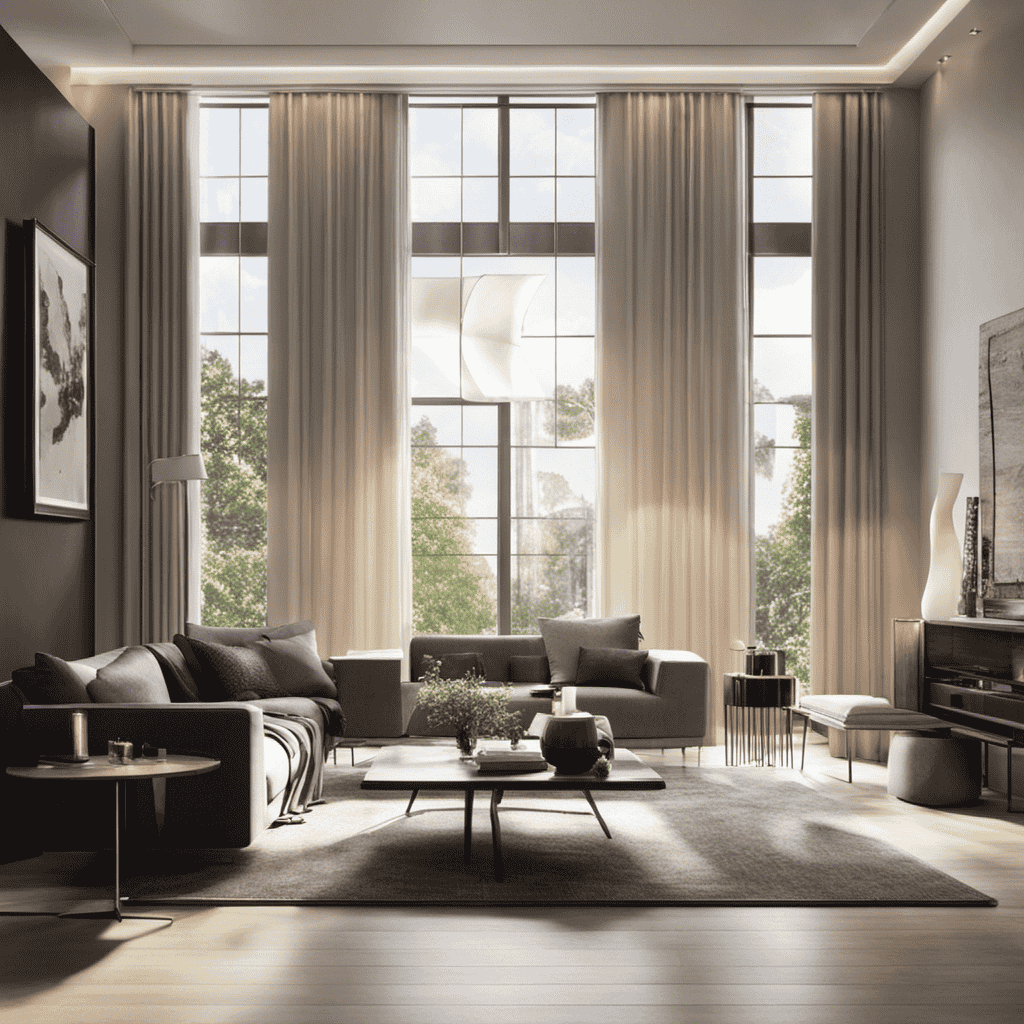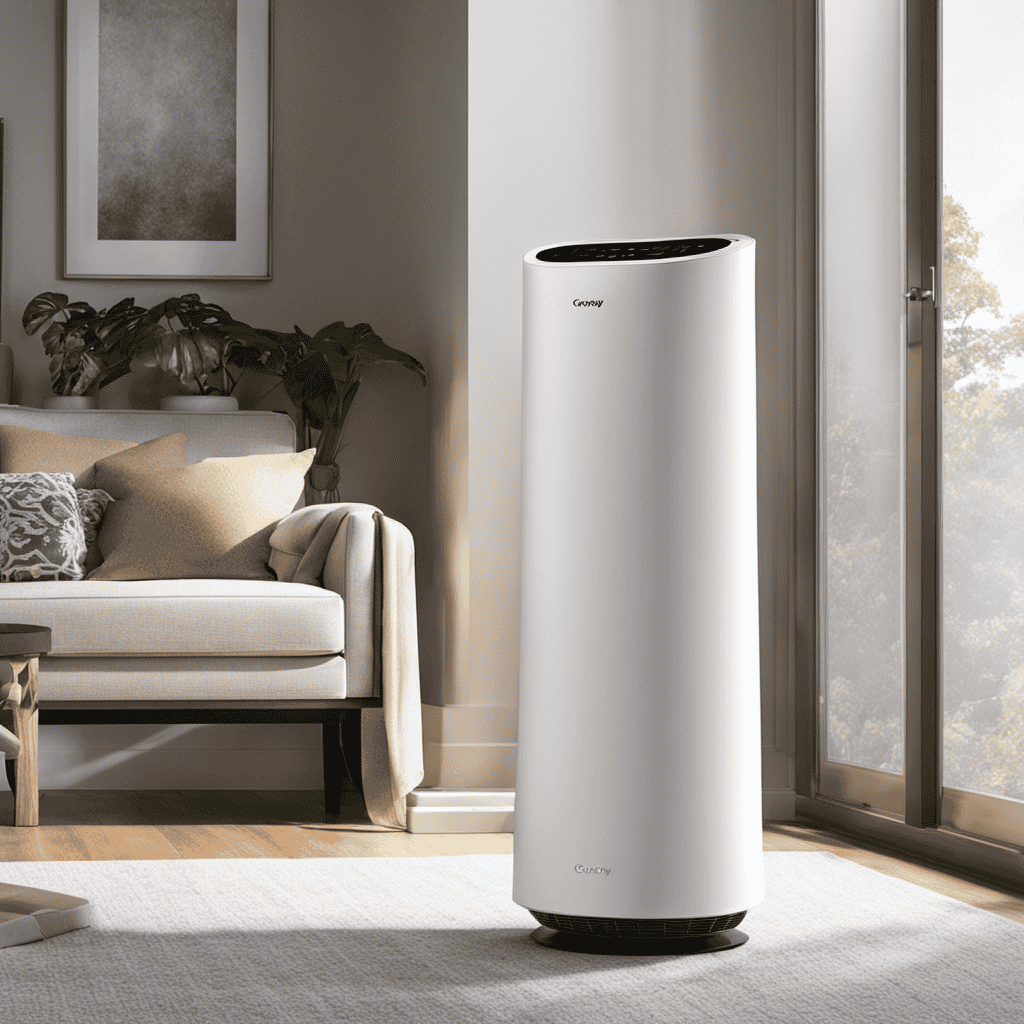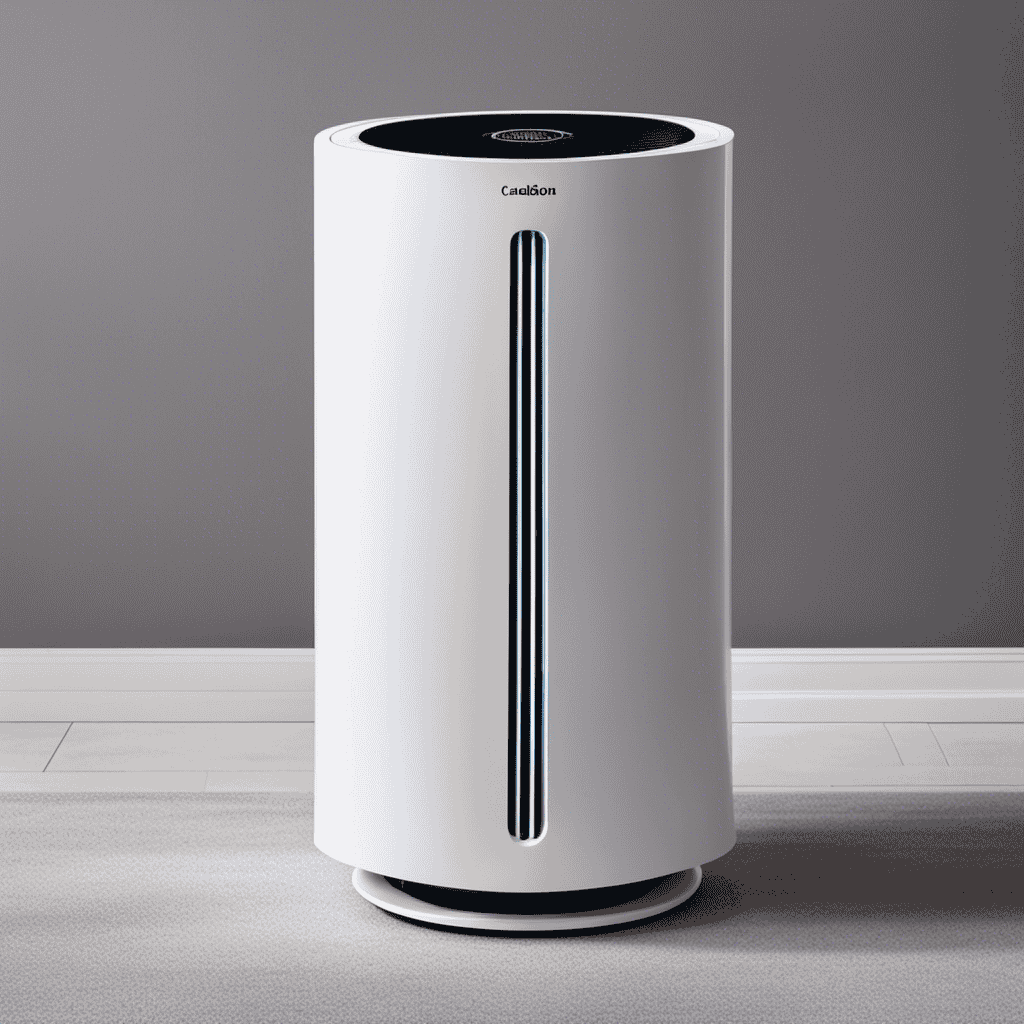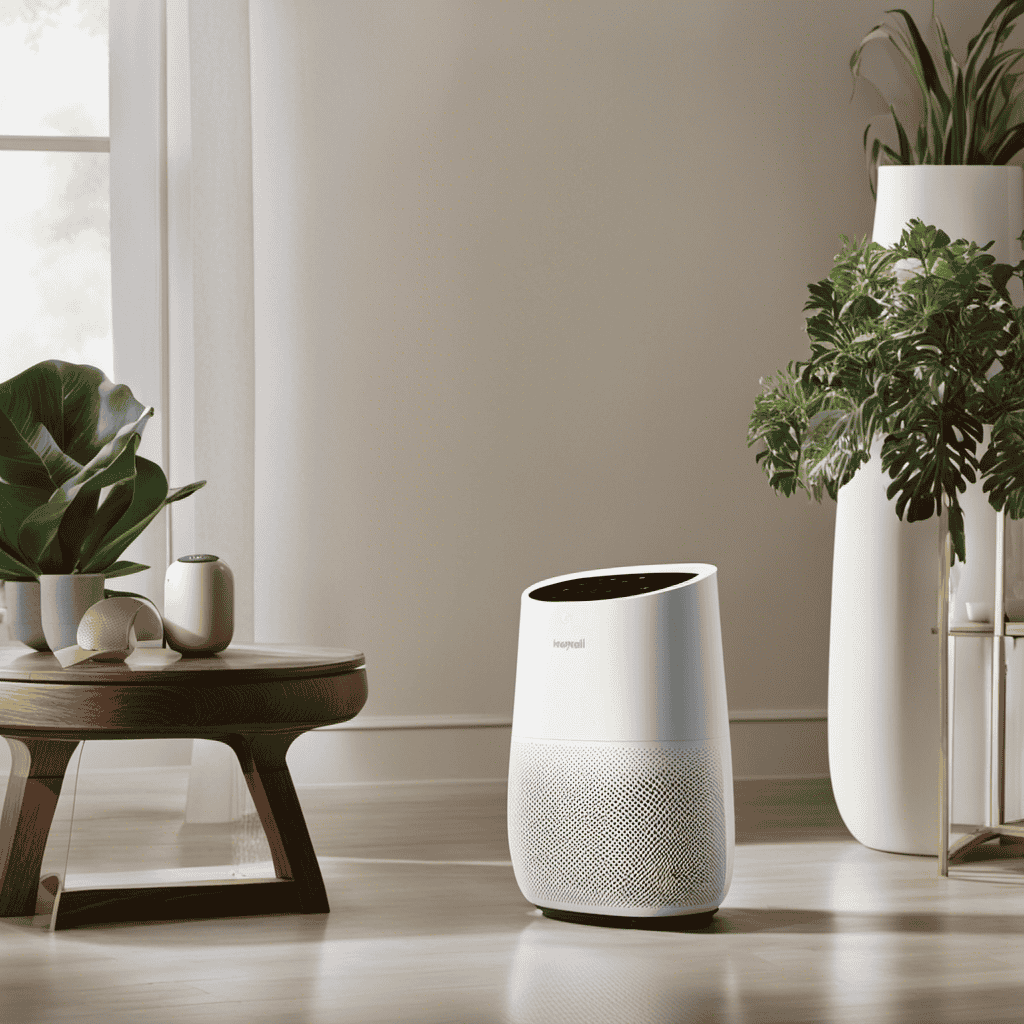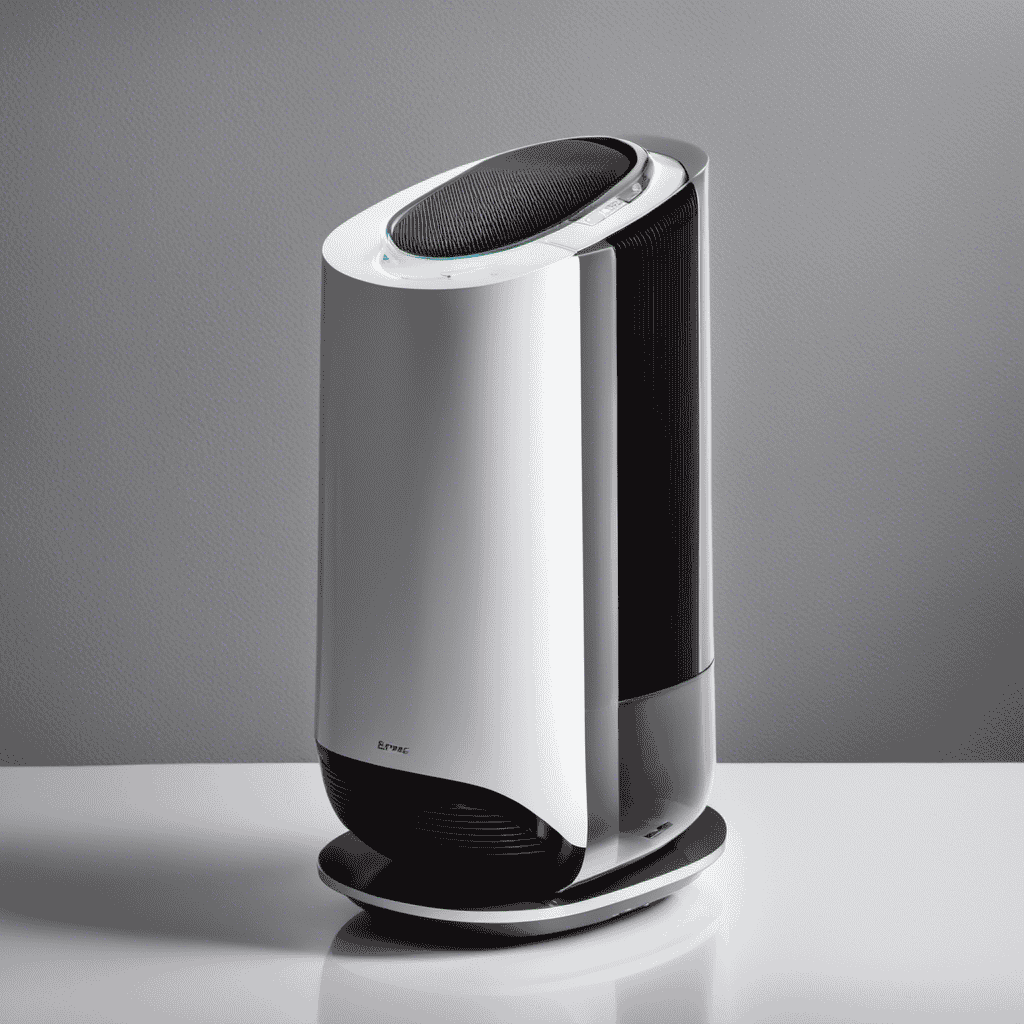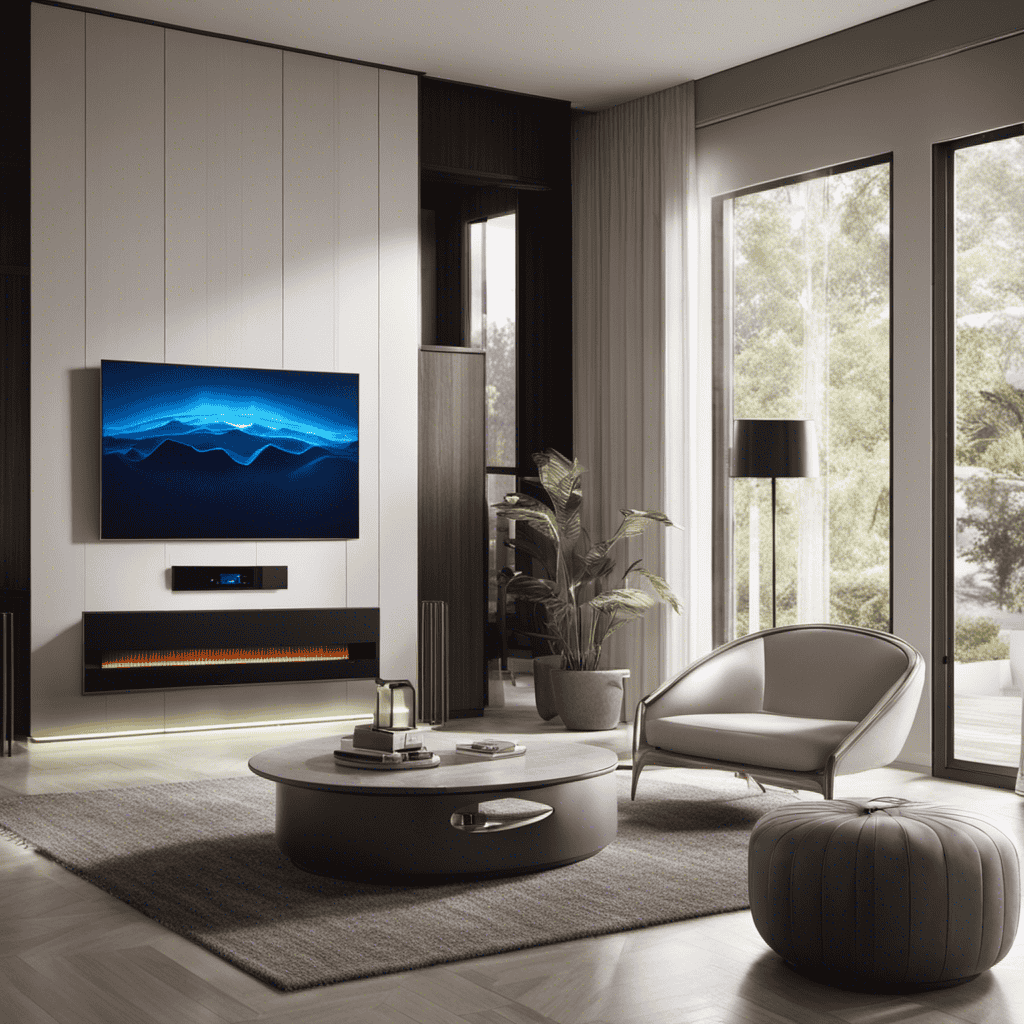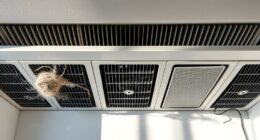As a homeowner, my top priority has always been to establish a safe and healthy environment for my family. This is why finding the best air purifier for my home was crucial.
With so many options available, it can be overwhelming to make the right choice. But fear not! In this article, I’ll guide you through the factors to consider, the types of air purifiers, and even the common indoor pollutants to watch out for.
Let’s embark on this journey together and find the perfect air purifier for your home.
Key Takeaways
- Consider the coverage area of the air purifier and choose one that matches or exceeds the size of the room where it will be used.
- Pay attention to the noise level of the air purifier, especially if you plan to use it in quiet spaces like bedrooms or offices.
- Look for air purifiers with HEPA and activated carbon filters to improve indoor air quality and reduce allergens.
- Investing in an air purifier can have various health benefits, including reducing allergy symptoms, improving respiratory health, enhancing sleep quality, increasing productivity, and reducing stress.
Factors to Consider When Choosing an Air Purifier
When choosing an air purifier, it’s important to consider factors such as room size and air quality needs. To make an informed decision, I recommend reading air purifier reviews and researching different air purifier brands.
Room size is crucial because it determines the purifier’s capacity to effectively clean the air. A small purifier may struggle in a large room, while a large purifier may be unnecessary for a small space.
Air quality needs vary from person to person. If you suffer from allergies or asthma, you may want an air purifier that specializes in removing allergens and particles from the air. Additionally, consider features like noise level, filter replacement costs, and energy efficiency.
Understanding the Different Types of Air Purifiers
When it comes to choosing an air purifier, it’s important to understand the different types available in the market.
With various options like HEPA filters, activated carbon filters, and ionizers, each type has its own unique way of filtering and purifying the air.
Types of Air Purifiers
One of the most common types of air purifiers is the HEPA filter. When considering an air purifier for your home, there are several factors to consider.
First and foremost, the efficiency of the filter is crucial. HEPA filters are known for their high efficiency in trapping particles as small as 0.3 microns. This means that they can effectively remove common allergens like dust, pollen, pet dander, and mold spores from the air.
Additionally, HEPA filters have the added benefit of improving indoor air quality by reducing the presence of harmful pollutants such as smoke, odors, and volatile organic compounds (VOCs). This makes HEPA filters a great choice for individuals with allergies, asthma, or other respiratory conditions.
Choosing the Right One
It’s important to consider factors such as efficiency and size when choosing the right air purifier for your home. Here are some key points to keep in mind:
-
Room size: Determine the square footage of the room where you plan to use the air purifier. This will help you choose the appropriate size and capacity.
-
Filtration system: Look for purifiers that have a high-efficiency particulate air (HEPA) filter. HEPA filters can trap particles as small as 0.3 microns, ensuring cleaner air.
-
Air exchange rate: Consider how many times the air purifier can exchange the air in the room per hour. A higher exchange rate means more efficient purification.
-
Noise level: Check the noise level of the purifier, especially if you plan to use it in your bedroom or living room.
-
Maintenance: Look for purifiers that are easy to clean and maintain, with filter replacement indicators for convenience.
The Importance of Clean Air in Your Home
Ensuring you have clean air in your home is essential for your health and well-being. Indoor air pollution is a serious problem that can lead to various respiratory issues, allergies, and even long-term health problems.
The benefits of clean air are numerous. Firstly, it helps to reduce the risk of respiratory infections and diseases, such as asthma. Secondly, it improves overall indoor air quality, making your home a more pleasant and comfortable environment to live in.
Thirdly, clean air can enhance sleep quality, as it reduces the presence of dust mites and other allergens that can disrupt sleep. Lastly, it promotes better cognitive function and productivity, as fresh air provides the brain with more oxygen, leading to improved focus and mental clarity.
To achieve clean air in your home, investing in an air purifier is a wise choice.
Common Indoor Air Pollutants and Their Effects
Common indoor air pollutants can have detrimental effects on your health and well-being. It is important to be aware of these pollutants and take steps to minimize their presence in your home. Here are five common indoor air pollutants and their effects:
-
Volatile Organic Compounds (VOCs): Found in cleaning products, paints, and furniture, VOCs can cause eye, nose, and throat irritation, as well as respiratory issues and headaches.
-
Mold and mildew: These fungi can trigger allergic reactions, worsen asthma symptoms, and cause respiratory infections.
-
Dust mites: These microscopic creatures thrive in bedding, upholstery, and carpets, and can trigger allergic reactions, asthma attacks, and eczema.
-
Pet dander: The tiny particles of dead skin shed by pets can cause allergic reactions and exacerbate asthma symptoms.
-
Tobacco smoke: Secondhand smoke contains over 7,000 chemicals and can lead to respiratory issues, heart disease, and lung cancer.
How to Determine the Size of Air Purifier You Need
To determine the size of air purifier you need, start by calculating the square footage of the area where you want to improve air quality. This is an important step in selecting the right size purifier as it ensures that the unit can effectively clean the air in the given space.
To measure the square footage, simply multiply the length of the room by its width. For example, if your room is 10 feet long and 12 feet wide, the square footage would be 120 square feet.
Once you have this measurement, you can refer to the manufacturer’s recommendations to find the appropriate purifier size for your room. It’s crucial to select a purifier that is designed to handle the square footage of your space to ensure optimal performance and air purification.
The Benefits of HEPA Filters in Air Purifiers
As an expert in air purifiers, I can confidently say that HEPA filters are essential for effective allergen removal.
These filters are designed to capture and trap even the smallest particles, including pollen, pet dander, and dust mites, ensuring that the air you breathe is clean and allergen-free.
Effective Allergen Removal
If you’re looking for the best air purifier for your home, you’ll want one that effectively removes allergens. Air purifiers are a great way to improve indoor air quality and reduce allergy symptoms. Here are five key factors to consider when looking for an air purifier that effectively removes allergens:
-
HEPA Filters: Look for an air purifier with a High Efficiency Particulate Air (HEPA) filter. These filters can capture particles as small as 0.3 microns, including allergens like pollen, dust mites, and pet dander.
-
Activated Carbon Filters: In addition to a HEPA filter, consider an air purifier with activated carbon filters. These filters can help remove odors, chemicals, and volatile organic compounds (VOCs) from the air.
-
Air Change Rate: Check the air change rate of the air purifier, which indicates how many times it can filter the air in a room per hour. A higher air change rate means better allergen removal.
-
Coverage Area: Determine the square footage of the room where you’ll be using the air purifier and choose one with a coverage area that matches or exceeds it.
-
Noise Level: Consider the noise level of the air purifier, especially if you’ll be using it in a bedroom or office space where quiet is important.
Improved Indoor Air Quality
By selecting an air purifier with HEPA and activated carbon filters, you can effectively improve indoor air quality. HEPA filters are designed to capture small particles, such as dust, pollen, pet dander, and mold spores, reducing the amount of allergens in the air. Activated carbon filters, on the other hand, are excellent at removing odors and harmful gases, like volatile organic compounds (VOCs) and chemicals. Together, these filters work to create a cleaner and healthier living environment. Indoor air pollution is a significant concern, as it can have negative effects on respiratory health. Poor air quality can lead to respiratory problems, such as asthma and allergies. By investing in an air purifier with HEPA and activated carbon filters, you can improve your indoor air quality and protect your respiratory health.
| Filter Type | Function | Benefits |
|---|---|---|
| HEPA | Captures small particles | Reduces allergens in the air |
| Activated Carbon | Removes odors and harmful gases | Improves indoor air quality |
| Combination | Combines HEPA and activated carbon | Provides comprehensive air purification |
Health Benefits for All
Now that we’ve discussed the importance of improved indoor air quality, let’s dive into the health benefits that come with it.
Having clean air in our homes is crucial for our overall well-being. Not only does it help us breathe easier, but it also has a positive impact on our physical and mental health.
Here are some key health benefits of maintaining good indoor air quality:
-
Reduced allergy symptoms: Clean air helps to minimize the presence of allergens such as dust mites, pollen, and pet dander, which can alleviate allergy symptoms.
-
Improved respiratory health: Breathing in clean air reduces the risk of respiratory issues like asthma and bronchitis.
-
Enhanced sleep quality: Good air quality promotes better sleep by ensuring that the air we breathe is free from pollutants and irritants.
-
Increased productivity: Clean air can boost focus, concentration, and overall productivity levels.
-
Stress reduction: Breathing clean air has a positive effect on our mental well-being, helping to reduce stress and anxiety.
To ensure that your indoor air quality remains optimal, consider incorporating indoor plants and using air quality monitors to keep track of the air you breathe.
UV-C Technology: Is It Effective in Air Purifiers
Have you considered whether UV-C technology is effective in air purifiers for your home? UV-C technology is a popular feature in many air purifiers, as it claims to kill germs and bacteria. However, it is important to understand the drawbacks and limitations of UV-C technology before making a decision.
While UV-C technology can be effective in killing germs and bacteria, it has some limitations. For example, UV-C light can only kill germs that are directly exposed to it. This means that it may not be as effective in eliminating germs that are hidden or located in hard-to-reach areas. Additionally, prolonged exposure to UV-C light can be harmful to humans and pets, so it is important to use these air purifiers with caution.
To help you better understand the effectiveness of UV-C technology in air purifiers, here is a table that compares its pros and cons:
| Pros | Cons |
|---|---|
| Effective in killing germs | Limited effectiveness in hidden or hard-to-reach areas |
| Can help reduce allergens | Prolonged exposure can be harmful to humans and pets |
| Low maintenance | May not be as effective against certain types of viruses |
Air Purifiers Vs. Air Filters: Which Is Better
When it comes to choosing between air purifiers and air filters, you may be wondering which option is better for improving the air quality in your home. While both options have their advantages, air purifiers offer several benefits that make them a popular choice among homeowners.
Here are some reasons why air purifiers are a great investment:
- Removes airborne pollutants such as dust, pollen, pet dander, and mold spores.
- Helps alleviate allergy and asthma symptoms by reducing the presence of allergens in the air.
- Eliminates odors from cooking, pets, and household chemicals.
- Improves overall air quality by trapping harmful particles and preventing them from circulating in your home.
- Some air purifiers also have additional features, such as built-in humidifiers, that can help maintain optimal humidity levels in your home.
With these benefits in mind, it’s clear that air purifiers are a powerful tool for improving indoor air quality. However, before making a purchase, it’s important to consider other factors such as noise levels, which we will explore in the next section.
Noise Level Considerations for Air Purifiers
Considering noise levels is an important factor when choosing an air purifier. No one wants a noisy machine disrupting their peace and quiet. Luckily, many air purifiers on the market today offer silent operation and noise reduction features. These features ensure that the air purifier works efficiently without causing any disturbance.
Look for air purifiers with sound ratings below 50 decibels, which is equivalent to a quiet conversation or light rainfall. Some models even have a ‘sleep mode’ option, which reduces noise levels even further during the night.
By prioritizing silent operation and noise reduction, you can enjoy cleaner air without sacrificing tranquility in your home.
Now, let’s move on to the next important consideration: energy efficiency and how it can save you money with an air purifier.
Energy Efficiency: Saving Money With an Air Purifier
Energy efficiency is a key factor in saving money with an air purifier. When considering an air purifier for your home, it is important to choose one that is energy-efficient. Here are some reasons why energy efficiency is crucial:
-
Lower Energy Consumption: An energy-efficient air purifier consumes less electricity, which can result in significant savings on your energy bills.
-
Smart Technology: Many modern air purifiers come with smart technology features that allow you to monitor and control energy usage remotely. This helps optimize energy consumption and reduce wastage.
-
Longer Lifespan: Energy-efficient air purifiers are designed to operate efficiently for longer periods, reducing the need for frequent replacements and saving you money in the long run.
-
Environmentally Friendly: By choosing an energy-efficient air purifier, you’re making a positive impact on the environment by reducing greenhouse gas emissions.
-
Rebates and Incentives: Some energy-efficient air purifiers may qualify for rebates or incentives offered by utility companies or government programs, further reducing their cost.
Considering these factors will not only help you save money but also contribute to a greener and healthier environment.
The Role of Activated Carbon Filters in Air Purifiers
When it comes to air purifiers, activated carbon filters play a crucial role in ensuring the effectiveness of the device.
These filters are designed to trap and remove harmful pollutants, such as chemicals and gases, from the air.
They are highly effective in eliminating unpleasant odors and can provide relief for individuals with allergies or sensitivities.
Additionally, the longevity of carbon filters can vary depending on factors such as usage and air quality, so it is important to consider the maintenance and replacement of these filters to ensure optimal performance.
Carbon Filter Effectiveness
To determine the effectiveness of carbon filters, you should research their ability to remove specific pollutants from the air. Carbon filters are known for their ability to trap and remove a wide range of contaminants, making them highly effective in improving indoor air quality.
Here are some key factors to consider when evaluating the effectiveness of carbon filters:
-
Particle Size: Carbon filters can effectively remove smaller particles such as dust, pollen, and mold spores.
-
Gaseous Pollutants: Carbon filters excel at removing volatile organic compounds (VOCs) and odors, making them ideal for households with smokers or pets.
-
Lifespan: It is important to consider the lifespan of carbon filters as they need to be replaced periodically for optimal performance.
-
Maintenance: Regular maintenance, such as cleaning or replacing the pre-filter, can enhance the effectiveness of carbon filters.
-
Alternative Methods: While carbon filters are highly effective, it is worth exploring other air purification methods like HEPA filters or UV-C technology for specific needs or preferences.
Odor Elimination Capabilities
When it comes to air purifiers, maintaining them is crucial for optimal performance. Regular maintenance ensures that your unit continues to effectively eliminate odors and improve the air quality in your home. By following a few simple steps, you can keep your air purifier running smoothly and efficiently.
One of the benefits of using an air purifier is its ability to eliminate unpleasant odors. Whether it’s cooking smells, pet odors, or cigarette smoke, a good air purifier can help to neutralize and eliminate these odors, leaving your home smelling fresh and clean. This is especially beneficial for individuals with allergies or sensitivities to certain smells.
To highlight the importance of odor elimination, here is a table that compares the odor elimination capabilities of different air purifier models:
| Air Purifier Model | Odor Elimination Capability |
|---|---|
| Model A | High |
| Model B | Moderate |
| Model C | Low |
| Model D | Very High |
Regular maintenance of your air purifier, combined with its odor elimination capabilities, can greatly improve the air quality in your home and provide a more pleasant living environment.
Longevity of Carbon Filters?
If you want your air smelling fresh and clean for a long time, make sure to regularly replace the carbon filters in your air purifier. Carbon filters play a crucial role in removing odors, gases, and chemicals from the air. Over time, however, these filters become saturated and lose their effectiveness.
The lifespan of a carbon filter depends on several factors, such as the quality of the filter, the air pollution levels, and the usage of the air purifier. On average, carbon filters last between 3 to 6 months. Regularly replacing them ensures that your air purifier continues to provide optimal performance.
Here are some benefits of activated carbon filters:
- Adsorption: Activated carbon has a large surface area that can trap and remove various pollutants from the air.
- Odor elimination: Carbon filters excel at removing unpleasant smells, such as smoke, pet odors, and cooking odors.
- Chemical removal: Activated carbon can effectively remove harmful chemicals and volatile organic compounds (VOCs) from the air.
- Allergen reduction: Carbon filters can help reduce allergens like pollen, dust mites, and mold spores, improving indoor air quality.
- Longevity: Regularly replacing carbon filters ensures that they continue to provide optimum air purification and maintain their effectiveness in removing pollutants.
Smart Features to Look for in an Air Purifier
Make sure you check out air purifiers with smart features like WiFi connectivity and app control. These advanced technologies can greatly enhance your air purification experience.
With smart technology, you can conveniently monitor and control your air purifier from anywhere using your smartphone or tablet. The WiFi connectivity allows you to connect your purifier to your home network, giving you easy access to its settings and functions.
Moreover, the app control feature enables you to adjust fan speed, set timers, and receive real-time notifications about your air quality. This means you can always stay informed and take necessary actions to maintain a clean and healthy environment.
Maintenance and Filter Replacement for Air Purifiers
Regular maintenance is essential for keeping your air purifier running efficiently and ensuring that it continues to provide clean air. Here are some important tips to help you maintain your air purifier and keep it in top-notch condition:
-
Clean or replace the filters regularly: Filters are the heart of an air purifier, trapping pollutants and allergens. Clean reusable filters as per the manufacturer’s instructions or replace disposable filters when they are clogged or worn out.
-
Vacuum the exterior and vents: Dust and debris can accumulate on the exterior and vents, hindering the airflow. Regularly vacuum these areas to keep them clean.
-
Check the fan and motor: Inspect the fan and motor for any signs of damage or dirt build-up. Clean them if necessary or contact the manufacturer for assistance.
-
Keep the unit in a well-ventilated area: Proper ventilation helps the air purifier function optimally. Avoid placing it in a cramped space or against a wall.
-
Follow the manufacturer’s instructions: Each air purifier may have specific maintenance requirements, so always refer to the user manual for guidance.
Ensuring regular maintenance and filter replacement will help extend the lifespan of your air purifier and maintain its efficiency in providing cleaner air.
Now, let’s explore what to look for in air purifiers specifically designed to alleviate allergies.
Air Purifiers for Allergies: What to Look for
When choosing an air purifier to alleviate allergies, you’ll want to prioritize models with HEPA filters. HEPA stands for High-Efficiency Particulate Air, and these filters are designed to capture 99.97% of particles as small as 0.3 microns. This is important because many allergens, such as pollen, dust mites, and pet dander, are within this size range.
Factors to consider when selecting an air purifier with a HEPA filter include the size of the room you want to purify, the CADR (Clean Air Delivery Rate) of the purifier, and the noise level it produces.
The benefits of HEPA filters are numerous. They remove common allergens from the air, making it cleaner and healthier to breathe. HEPA filters also help reduce asthma symptoms and improve indoor air quality overall.
Budget-Friendly Air Purifiers: Finding the Best Value
When it comes to finding the best value in air purifiers, there are a few key points to consider.
First, it’s important to review affordable options that are available on the market. This will allow us to compare the cost versus effectiveness of different models and determine their long-term savings potential.
Affordable Options Reviewed
If you’re looking for an air purifier that won’t break the bank, there are plenty of affordable options to consider. When comparing affordable options, it’s important to take into account the effectiveness, features, and brand reputation.
Here are some of the best air purifier brands that offer affordable options:
-
Honeywell: Known for their reliable and budget-friendly air purifiers, Honeywell offers models with HEPA filters and advanced filtration technologies.
-
Germ Guardian: This brand is popular for its affordable air purifiers that combine HEPA filtration with UV-C light technology to remove airborne germs and allergens.
-
Levoit: Levoit air purifiers are known for their sleek design and efficient purification systems, including HEPA filters and activated carbon filters.
-
Winix: Winix offers affordable air purifiers with True HEPA filters and plasma wave technology to capture and neutralize pollutants.
-
Blueair: Blueair air purifiers are known for their high-quality construction and efficient filtration systems, including HEPA filters and electrostatic ionizers.
When comparing these affordable options, it’s important to consider both the cost and effectiveness of the air purifier.
Cost Vs. Effectiveness Comparison
To compare cost and effectiveness, consider both the price and the performance of the air purifiers. When looking for an air purifier, it’s important to find one that not only fits your budget but also effectively cleans the air in your home. To help with the decision-making process, I have created a table that compares the cost effectiveness and performance of three popular air purifiers:
| Air Purifier | Price Range | CADR Rating |
|---|---|---|
| Model A | $100-$200 | 300 |
| Model B | $200-$300 | 400 |
| Model C | $300-$400 | 500 |
Long-Term Savings Potential
The long-term savings potential of choosing a more affordable air purifier with a higher CADR rating can greatly benefit you financially. Not only will you save money upfront, but you’ll also see savings in the long run through reduced energy consumption and longer filter lifespan.
Here are five reasons why investing in an air purifier with these features is a smart financial choice:
-
Lower energy consumption: Air purifiers with higher CADR ratings typically have more efficient motors, resulting in lower energy usage and reduced electricity bills.
-
Extended filter lifespan: A higher CADR rating means the air purifier can clean the air more quickly and effectively. This reduces the workload on the filters, resulting in a longer filter lifespan and fewer filter replacements, saving you money.
-
Cost-effective replacement filters: When it is time to replace the filters, air purifiers with higher CADR ratings often have more affordable replacement filters, which can save you money over time.
-
Reduced maintenance costs: With a more efficient air purifier, you’ll spend less time and money on maintenance and troubleshooting. This means fewer repair costs and more savings in the long run.
-
Higher resale value: Investing in a reputable air purifier brand with a higher CADR rating can increase the resale value of your unit. Should you decide to upgrade or sell your air purifier in the future, you can recoup some of your investment.
Can the Best Air Purifier for Allergies Also Be Used for General Home Use?
Yes, the best air purifier for allergies can also be used for general home use. These high-quality purifiers are designed to remove allergens, dust, and other airborne particles, making the air cleaner and healthier for everyone in the home. Investing in the best air purifier allergies can benefit everyone.
Frequently Asked Questions
Can Air Purifiers Completely Eliminate All Indoor Air Pollutants?
Yes, air purifiers can effectively remove many indoor air pollutants. However, it’s important to note that regular air purifier maintenance is necessary to ensure optimal performance. The benefits of using air purifiers include improved air quality and reduced respiratory issues.
How Often Should Air Purifier Filters Be Replaced?
I replace my air purifier filters regularly to ensure efficient air purification. Signs of a dirty filter include reduced airflow and a noticeable decrease in air quality. Proper air purifier maintenance is key to clean indoor air.
Are Air Purifiers Effective in Reducing Pet Dander and Pet Odors?
Air purifiers can effectively reduce pet dander and pet odors, making them a great option for pet owners who suffer from allergies. They filter out allergens and neutralize odors, improving indoor air quality.
Can Air Purifiers Help With Respiratory Conditions Such as Asthma or Allergies?
Air purifiers can improve sleep quality by filtering out allergens and irritants that can disrupt sleep. They can also help reduce exposure to secondhand smoke, making them beneficial for those with respiratory conditions like asthma and allergies.
Can Air Purifiers Remove Mold Spores From the Air?
Air purifiers can help remove mold spores from the air, but they are not a substitute for proper mold remediation. They can be beneficial in preventing mold growth by filtering out airborne mold particles.
Conclusion
After thoroughly researching and analyzing various air purifiers, I can confidently say that investing in clean air for your home is essential.
Breathing fresh, pure air not only promotes better health but also creates a tranquil environment.
Imagine coming home to a space where you can finally take a deep breath, free from the worries of indoor air pollutants.
With the right air purifier, you can create this haven and protect your loved ones from allergies and respiratory issues.
Remember, your home deserves the best air purifier that suits your needs and budget.
